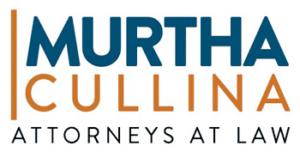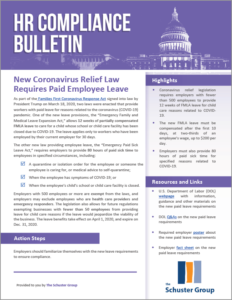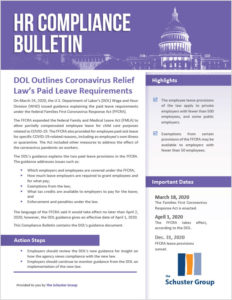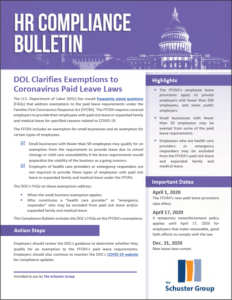COVID-19 UPDATES
As information about COVID-19 is being updated on a daily basis, we have aggregated content we believe to be beneficial to our clients and partners. Use the links below to navigate the different categories of content.
OSHA Guidance on Returning to Work
 The U.S. Department of Labor’s Occupational Safety and Health Administration (OSHA) has issued guidance to assist employers reopening non-essential businesses and their employees returning to work during the evolving coronavirus pandemic. The guidance supplements the U.S. Department of Labor and U.S. Department of Health and Human Services’ previously developed Guidance on Preparing Workplaces for COVID-19 and the White House’s Guidelines for Opening Up America.
The U.S. Department of Labor’s Occupational Safety and Health Administration (OSHA) has issued guidance to assist employers reopening non-essential businesses and their employees returning to work during the evolving coronavirus pandemic. The guidance supplements the U.S. Department of Labor and U.S. Department of Health and Human Services’ previously developed Guidance on Preparing Workplaces for COVID-19 and the White House’s Guidelines for Opening Up America.
How-To Information on Using and Removing PPE
 With society reopening, the use of PPE is as important as ever. Please see the downloads and videos below to help guide in on putting on and taking off PPE. There is also a how-to on creating a cloth mask at home.
With society reopening, the use of PPE is as important as ever. Please see the downloads and videos below to help guide in on putting on and taking off PPE. There is also a how-to on creating a cloth mask at home.
- Important Information About Your Cloth Face Coverings Download
- How to Safely Wear and Take Off a Cloth Face Covering Download
- Use of Cloth Face Coverings & Create Your Own Mask Download
- Putting On (Donning) Your PPE Correctly Video
- Taking Off (Doffing) Your PPE Safely Video
Employee & Employer Resources
Returning to Work Post-COVID-19 – Employer Presentation
 Are you and your employees heading back into the office soon? Use this customizable presentation to educate your employees on your post-coronavirus return-to-work action plan. You can discuss how employees can contribute to their overall health and safety and provide appropriate and accurate resources for employees regarding COVID-19, and health and wellness.
Are you and your employees heading back into the office soon? Use this customizable presentation to educate your employees on your post-coronavirus return-to-work action plan. You can discuss how employees can contribute to their overall health and safety and provide appropriate and accurate resources for employees regarding COVID-19, and health and wellness.
Reopening Workplaces During COVID-19 – Chart
 This chart is designed to help employers that are making decisions regarding reopening workplaces during the coronavirus disease (COVID-19) pandemic, following guidance from the Centers for Disease Control and Prevention.
This chart is designed to help employers that are making decisions regarding reopening workplaces during the coronavirus disease (COVID-19) pandemic, following guidance from the Centers for Disease Control and Prevention.
Download the Chart
Reopen Connecticut – Sector Rules
 Governor Ned Lamont announced the release of documents detailing specific rules that eligible businesses falling under phase 1 of Connecticut’s reopening plans must follow amid the ongoing COVID-19 pandemic. The first phase – which includes restaurants; offices; hair salons and barbershops; retail stores; and outdoor museums and zoos – is currently planned to take effect beginning May 20.
Governor Ned Lamont announced the release of documents detailing specific rules that eligible businesses falling under phase 1 of Connecticut’s reopening plans must follow amid the ongoing COVID-19 pandemic. The first phase – which includes restaurants; offices; hair salons and barbershops; retail stores; and outdoor museums and zoos – is currently planned to take effect beginning May 20.
Go to Plan Download Page
Creating a Return to Work Plan
 Echoing the sentiments of public health officials, a return to normalcy won’t be like flipping a switch, but
Echoing the sentiments of public health officials, a return to normalcy won’t be like flipping a switch, but
rather a gradual effort. In preparation for reopening your business and asking employees to come back
to work, it’s imperative that your company thoughtfully constructs a return to work action plan for its
employees to keep everyone healthy and safe following the COVID-19 pandemic.
Download the Plan
HR Insights – Business Travel After COVID-19
 Travel—for both business and leisure—worldwide has virtually come to a standstill during the coronavirus pandemic. At this point, nobody knows when it will come back. Whenever that time comes though, travel will certainly be different than it was before. Airports, airlines, hotels and car rental companies will likely be taking new precautions as companies start greenlighting travel for business purposes.
Travel—for both business and leisure—worldwide has virtually come to a standstill during the coronavirus pandemic. At this point, nobody knows when it will come back. Whenever that time comes though, travel will certainly be different than it was before. Airports, airlines, hotels and car rental companies will likely be taking new precautions as companies start greenlighting travel for business purposes.
Read More
 Legal Updates Related to Covid-19
Legal Updates Related to Covid-19
TANGO Partner Murtha Cullina LLP is actively monitoring the latest legal news and updates regarding COVID-19. In order to prioritize the health of their clients, they are offering this list of client alerts and practice group contact information.
PPP Guidance for Employees Refusing to Return to Work
 The Small Business Administration (SBA) recently issued new guidance regarding the Payment Protection Program (PPP), established to offset the economic effects of the coronavirus pandemic. This new guidance from the SBA concerns employees who refuse to return to work after a business reopens. Read More
The Small Business Administration (SBA) recently issued new guidance regarding the Payment Protection Program (PPP), established to offset the economic effects of the coronavirus pandemic. This new guidance from the SBA concerns employees who refuse to return to work after a business reopens. Read More
Meditation Mental Health During COVID-19 Pandemic
The coronavirus pandemic has changed what a normal day looks like for many across the country. And the pandemic has also increased the stress of many Americans. Prioritizing mental health and well-being in the face of a pandemic, which has caused many to lose their jobs or work from home, is something that every single person should be doing, but it often falls by the wayside.
Read More
Extension of Certain Timeframes for Employee Benefit Plans, Participants and Beneficiaries
On May 4, 2020, the DOL and the Department of the Treasury (the Departments) issued guidance providing an extension of various compliance deadlines in its “Extension of Certain Timeframes for Employee Benefit Plans, Participants, and Beneficiaries Affected by the COVID-19 Outbreak” final rule. Recognizing the potential difficulties for group health plans attempting to comply with certain notice obligations due to the COVID-19 public health crisis, and in effort to minimize the possibility of individuals losing benefits due to a failure to timely meet requirements, the Departments have extended certain timeframes for group health plans, disability and other welfare plans, and pension plans.
Read More
Coronavirus-related Relief for Retirement Plans and IRAs Questions and Answers
On May 4, 2020, the IRS released a set of questions and answers discussing retirement plan provisions of the CARES Act. Section 2202 of the Coronavirus Aid, Relief, and Economic Security Act (CARES Act), enacted on March 27, 2020, provides for special distribution options and rollover rules for retirement plans and IRAs and expands permissible loans from certain retirement plans.
Read More
DOL Issues New COBRA Model Notices
On May 1, 2020, the DOL issued a series of questions and answers regarding COBRA, as well as a new set of model notices. As background, regulations governing COBRA require plan administrators to provide persons who enroll in the plan with an initial notice of their right to elect COBRA when they initially sign up for plan coverage. Plan administrators must also provide those persons who lost coverage after the occurrence of certain events with an election notice that explains their rights to coverage through COBRA and provides them with an opportunity to make that election. The agency updated these model notices. Read More
Meditation Mental Health During COVID-19 Pandemic
 The coronavirus pandemic has changed what a normal day looks like for many across the country. And the pandemic has also increased the stress of many Americans. Prioritizing mental health and well-being in the face of a pandemic, which has caused many to lose their jobs or work from home, is something that every single person should be doing, but it often falls by the wayside. Maintaining your mental health during these uncertain times can be challenging, especially if you’re not sure how to get started. That’s where meditation can help. There are many different types of meditation to try, and you can see its positive effects after a few minutes.
The coronavirus pandemic has changed what a normal day looks like for many across the country. And the pandemic has also increased the stress of many Americans. Prioritizing mental health and well-being in the face of a pandemic, which has caused many to lose their jobs or work from home, is something that every single person should be doing, but it often falls by the wayside. Maintaining your mental health during these uncertain times can be challenging, especially if you’re not sure how to get started. That’s where meditation can help. There are many different types of meditation to try, and you can see its positive effects after a few minutes.
Download the Guide
Maintain Your Mental Well being During Quarantine
 To prevent the spread of coronavirus disease 2019 (COVID-19), states across the nation have asked that you stay home. While following these orders is essential for your health and the health of your loved ones, quarantining can have negative effects on your mental well-being. By keeping these tips in mind, you can prioritize your mental well-being during these uncertain times. If you have concerns about your mental health, please contact a mental health professional.
To prevent the spread of coronavirus disease 2019 (COVID-19), states across the nation have asked that you stay home. While following these orders is essential for your health and the health of your loved ones, quarantining can have negative effects on your mental well-being. By keeping these tips in mind, you can prioritize your mental well-being during these uncertain times. If you have concerns about your mental health, please contact a mental health professional.
Download the Guide
DOL Now Fully Enforcing FFCRA Paid Leave Rules for Coronavirus
 After observing a 30-day nonenforcement period to help employers come into compliance with new paid leave rules, the U.S. Department of Labor (DOL) has announced that it is fully enforcing all provisions of the Families First Coronavirus Response Act (FFCRA). The FFCRA requires private employers with fewer than 500 employees and certain government employers to provide paid leave for their employees, either for the employees’ own health needs or to care for others, for reasons related to the coronavirus (COVID-19) pandemic. These requirements apply for employee leave taken between April 1 and Dec. 31, 2020.
After observing a 30-day nonenforcement period to help employers come into compliance with new paid leave rules, the U.S. Department of Labor (DOL) has announced that it is fully enforcing all provisions of the Families First Coronavirus Response Act (FFCRA). The FFCRA requires private employers with fewer than 500 employees and certain government employers to provide paid leave for their employees, either for the employees’ own health needs or to care for others, for reasons related to the coronavirus (COVID-19) pandemic. These requirements apply for employee leave taken between April 1 and Dec. 31, 2020.
Download the Update
MassMutual announces $3 billion of free life insurance for healthcare workers on the COVID-19 frontline
 Massachusetts Mutual Life Insurance Company (MassMutual) today announced the launch of MassMutual HealthBridge, which will provide free term life insurance to the brave and resilient frontline healthcare workers across Massachusetts and Connecticut risking their lives during the COVID-19 pandemic. MassMutual is committed to its Live Mutual belief that we are all in this together and is offering local healthcare workers who are putting their safety on the line no-cost policies of up to $25,000. Read More
Massachusetts Mutual Life Insurance Company (MassMutual) today announced the launch of MassMutual HealthBridge, which will provide free term life insurance to the brave and resilient frontline healthcare workers across Massachusetts and Connecticut risking their lives during the COVID-19 pandemic. MassMutual is committed to its Live Mutual belief that we are all in this together and is offering local healthcare workers who are putting their safety on the line no-cost policies of up to $25,000. Read More
Charitable giving in the age of COVID-19: Frequently asked questions
The COVID-19 pandemic has raised many questions about charitable giving. Many of those questions relate to how an organization can give money to its employees who are impacted by current events. The CohnResnick Exempt Organizations Tax Services (EOTS) team members have put together answers to several frequently asked questions to assist in navigating through options available for charitable giving.
CARES Act Includes Relief for Tax-Exempt Organizations
The Coronavirus Aid, Relief, and Economic Security Act (the “CARES Act”) was enacted on March 27, 2020 and provides emergency relief to the American people and businesses in response to the COVID-19 public health crisis. Relief for tax-exempt organizations is explicitly included in the CARES Act. The type and amount of relief, in some instances, depends on the organization’s size and its classification under Section 501 of the Internal Revenue Code.
Learn more at MurthaCullina.com
CDC Guidance for Employees Following a COVID-19 Diagnosis or Exposure
This HR Insights article discusses guidance from the Centers for Disease Control and Prevention (CDC) regarding discontinuing home isolation and dealing with exposure to coronavirus disease 2019 (COVID-19). . READ MORE
EXECUTIVE ORDER NO. 7S
Protection Of Public Health And Safety During Covid-19 Pandemic And Response – Safe Stores, Relief For Policyholders, Taxpayers, And Tenants
Review the portion of the Governor’s Executive order pertaining to premium payments, policy cancellations and non-renewals of insurance policies. A full download of the order is included. Read more
Providing Assistance for Small Businesses
The US Small Business Administration’s (SBA) Paycheck Protection Program (PPP) was enacted to provide support for Americans employed by small businesses through the authorization of up to $349 billion to preserve jobs and cover other eligible expenses. Eligible businesses affected by COVID-19 can apply for PPP loans designed to serve as an incentive to keep their workers on the payroll.
The PPP is for small businesses with less than 500 employees (including sole proprietorships, independent contractors and self-employed individuals), eligible nonprofit organizations, Veterans organizations and Tribal businesses described in the Small Business Act.
For more information:
- Find an overview of the program here.
- The PPP sample application form can be found here.
- Apply for relief under the PPP here.
- Information about local SBA offices is available here.
Zoombombing: What it is and how to prevent it in Zoom video chat
 Video-conferencing software Zoom has been the goto video conferencing software duding the COVID-19 outbreak due to its free option and easy to use interface. But, it has been drawing attention from researchers and journalists lately for a number of potential privacy and security issues, as use of the platform surges. One of the biggest security issues facing Zoom is the surge in “Zoombombing,” when uninvited attendees break into and disrupt your meeting. CNET has an article about Zoombombing and a step-by-step guide on how to improve your Zoom security.
Video-conferencing software Zoom has been the goto video conferencing software duding the COVID-19 outbreak due to its free option and easy to use interface. But, it has been drawing attention from researchers and journalists lately for a number of potential privacy and security issues, as use of the platform surges. One of the biggest security issues facing Zoom is the surge in “Zoombombing,” when uninvited attendees break into and disrupt your meeting. CNET has an article about Zoombombing and a step-by-step guide on how to improve your Zoom security.
COVID-19 Economic Injury Disaster Loans for Small Businesses
Small business owners in all U.S. states, Washington D.C., and territories are eligible to apply for an Economic Injury Disaster Loan advance of up to $10,000. The loan advance will provide economic relief to businesses that are currently experiencing a temporary loss of revenue. Funds will be made available within three days of a successful application, and this loan advance will not have to be repaid.
The SBA’s Economic Injury Disaster Loan program provides small businesses with working capital loans of up to $2 million that can provide vital economic support to small businesses to help overcome the temporary loss of revenue they are experiencing.
Economic Injury Disaster Loans are also available to residents in declared disaster areas.
Go to SBA.gov to learn more and apply
COVID-19 and the American Workplace
The Wage and Hour Division of the Department of Labor provides information on common issues employers and employees face when responding to COVID-19, and its effects on wages and hours worked under the Fair Labor Standards Act (FLSA), job-protected leave under the Family and Medical Leave Act (FMLA), and paid sick leave and expanded family and medical leave under the Families First Coronavirus Response Act (FFCRA). LEARN MORE (DOL)
Workplace Safety from DOL
The Occupational Safety and Health Administration (OSHA) has resources to help employers and workers prepare for and respond to coronavirus in the workplace.
- OSHA Guidance on Preparing Workplaces for COVID-19 – Developed in collaboration with the U.S. Department of Health and Human Services to help employers respond in the event of coronavirus in the workplace.
- Temporary OSHA Guidance on Respiratory Protection Standard – This guidance provides suggestions and options to help increase the availability of N95 filtering facepiece respirators for healthcare providers.
- COVID-19 Webpage – Provides infection prevention information specifically for employers and workers.
Business Exemptions for Coronavirus – Executive Order 7H
Businesses and nonprofits seeking guidance related to Governor Lamont’s “Stay Safe, Stay Home” executive order directing all non-essential workers statewide to work from home are urged to read the guidance provided by DECD.
Remote Working Guidelines and Tips Downloads
- An Employers Quick Guide to Managing Remote Workers
The coronavirus disease 2019 (COVID-19) has caused many employers across the country to shift their employees from working at the office to working from home. This guide serves as an introduction to managing remote employees and includes best practices for keeping employees engaged. - Managing Remote Employees Checklist
Employers can use this checklist to manage employees who are working from home during the COVID-19 pandemic. - Employees Work From Home Guide
Employers can use this customizable guide to outline their company’s telecommuting or work from home policy and expectations, and educate employees on best practices for working from home during the COVID-19 pandemic.
HR Compliance Bulletins

DOL Clarifies Exemptions to Coronavirus Paid Leave Laws
The U.S. Department of Labor (DOL) has issued temporary regulations under the Families First Coronavirus Response Act (FFCRA). The FFCRA created new employer requirements to provide paid sick leave and partially compensated, expanded FMLA leave for reasons related to the COVID-19 pandemic. The regulations include important clarifications to the law and earlier DOL guidance on the FFCRA that will help employers understand their obligations under these new paid leave mandates. READ MORE

The Look-back Measurement Method and COVID-19
The Affordable Care Act (ACA) requires applicable large employers (ALEs) to offer affordable, minimum value health coverage to their full-time employees or possibly pay a penalty. This employer mandate is also known as the “employer shared responsibility” or “pay or play” rules. ALEs can use one of two methods to determine whether employees are full time under the employer shared responsibility rules. DOWNLOAD THE BULLETIN
DOL Outlines Coronavirus Relief Law’s Paid Leave Requirements
The Families First Coronavirus Response Act (the Act) requires employers to provide paid leave for some employees related to the coronavirus (COVID-19) pandemic, among other measures. On March 24, 2020, the U.S. Department of Labor’s (DOL) Wage and Hour Division (WHD) issued guidance explaining the paid leave requirements under the federal Families First Coronavirus Response Act (FFCRA). READ MORE (DOL)
DOL Clarifies Exemptions to Coronavirus Paid Leave Laws
The U.S. Department of Labor (DOL) has issued frequently asked questions (FAQs) that address exemptions to the paid leave requirements under the Families First Coronavirus Response Act (FFCRA). The FFCRA requires covered employers to provide their employees with paid sick leave or expanded family and medical leave for specified reasons related to COVID-19. READ MORE

New Coronavirus Relief Law Requires Paid Employee Leave
As part of the Families First Coronavirus Response Act, two laws were enacted that provide workers with paid leave for reasons related to the coronavirus (COVID-19) pandemic. One of the new leave provisions, the “Emergency Family and Medical Leave Expansion Act,” allows 12 weeks of partially compensated FMLA leave to care for a child whose school or child care facility has been closed due to COVID-19. The leave applies only to workers who have been employed by their current employer for 30 days. READ MORE
Webinars
Weekly HR Solutions, Benefits Compliance, and Retirement Webinar Series
As a Benefits Partner Firm of NFP one of the country’s largest privately held insurance brokers we can bring enhanced national resources to our valued clients and associates. We are hosting two weekly updates with NFP on Tuesdays and Wednesdays through the month of April on subjects emerging from the Coronavirus crisis. Tuesday’s webinars will focus on Legal & Benefits Compliance. Wednesday’s webinars will focus on HR Related Issues.
Click here to learn more and register for the Weekly Benefits Compliance Webinar
Tuesdays @ 12:00 EST
Click here to learn more and register for the Weekly HR Solutions Webinar
Wednesdays @ 12:00 EST
Click here to learn more and register for the Weekly Retirement Webinar
Wednesdays @ 12:00 EST
Webinar Recaps
Benefits Compliance Updates & FAQs Webinars
 NFP’s HR Solutions team addressed a vast number of HR-related issues emerging from the coronavirus crisis including: new emergency paid sick requirements, expanded FMLA protections, employer tax credits, aid for state unemployment plans, and mandated COVID-19-related health insurance coverage requirements.
NFP’s HR Solutions team addressed a vast number of HR-related issues emerging from the coronavirus crisis including: new emergency paid sick requirements, expanded FMLA protections, employer tax credits, aid for state unemployment plans, and mandated COVID-19-related health insurance coverage requirements.
4/28/2020 Webinar
Watch Webinar Recording and Download Slide Deck here
4/21/2020 Webinar
Watch Webinar Recording
Download Slide Deck
4/14/2020 Webinar
Watch Webinar Recording
Download Slide Deck
4/7/2020 Webinar
Watch Webinar Recording
Download Slide Deck
3/31/2020 Webinar
Watch Webinar Recording
Download Slide Deck
3/24/2020 Webinar
Watch Webinar Recording
Download Slide Deck
HR Solutions Updates & FAQs Webinars
 NFP’s HR Solutions team addressed a vast number of HR-related issues emerging from the coronavirus crisis including: new emergency paid sick requirements, expanded FMLA protections, employer tax credits, aid for state unemployment plans, and mandated COVID-19-related health insurance coverage requirements.
NFP’s HR Solutions team addressed a vast number of HR-related issues emerging from the coronavirus crisis including: new emergency paid sick requirements, expanded FMLA protections, employer tax credits, aid for state unemployment plans, and mandated COVID-19-related health insurance coverage requirements.
4/29/2020 Webinar
Watch Webinar Recording and Download Slide Deck here
4/22/2020 Webinar
Watch Webinar Recording and Download Slide Deck here
4/15/2020 Webinar
Watch Webinar Recording
Download Slide Deck
4/8/2020 Webinar
Watch Webinar Recording
Download Slide Deck
4/1/2020 Webinar
Watch Webinar Recording
Download Slide Deck
3/25/2020 Webinar
Watch Webinar Recording
Download Slide Deck
COVID-19 General Health Info
How to Protect Yourself & Others – CDC
There is currently no vaccine to prevent coronavirus disease 2019 (COVID-19).
The best way to prevent illness is to avoid being exposed to this virus.
The virus is thought to spread mainly from person-to-person.
General info and safety from USA Today
USA Today has a series of articles on their website with information about COVID-19. They are utilizing data from major health organizations. What sets this info apart is its use of static and animated visuals to make the subjects easier to understand. Here are a few articles:
- How long does the coronavirus live on surfaces?
- First defense against coronavirus: 20 seconds of proper hand-washing
- Sick at home with COVID-19: How to care for your loved ones infected with coronavirus
- What does the coronavirus do to your body? Everything to know about the infection process
- How coronavirus spreads so quickly and how you can slow it down
- Cases in China: How coronavirus moved from one person to many in a matter of days
Shopping and Takeout Safety
This video by Dr. Jeffrey VanWingen has garnered over 25 million views in under three days. It provides general guidelines for grocery shopping and ordering take out safely.



